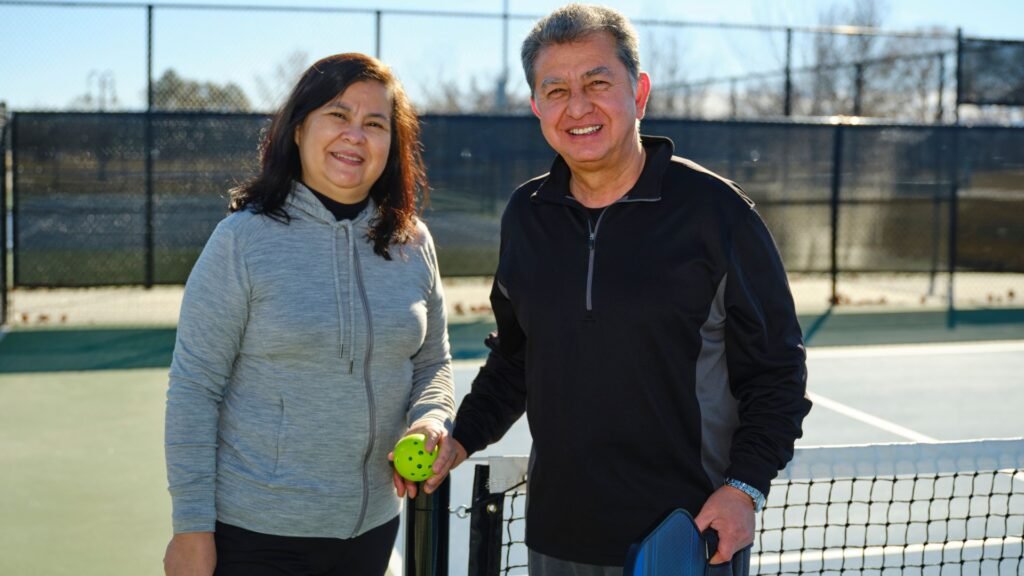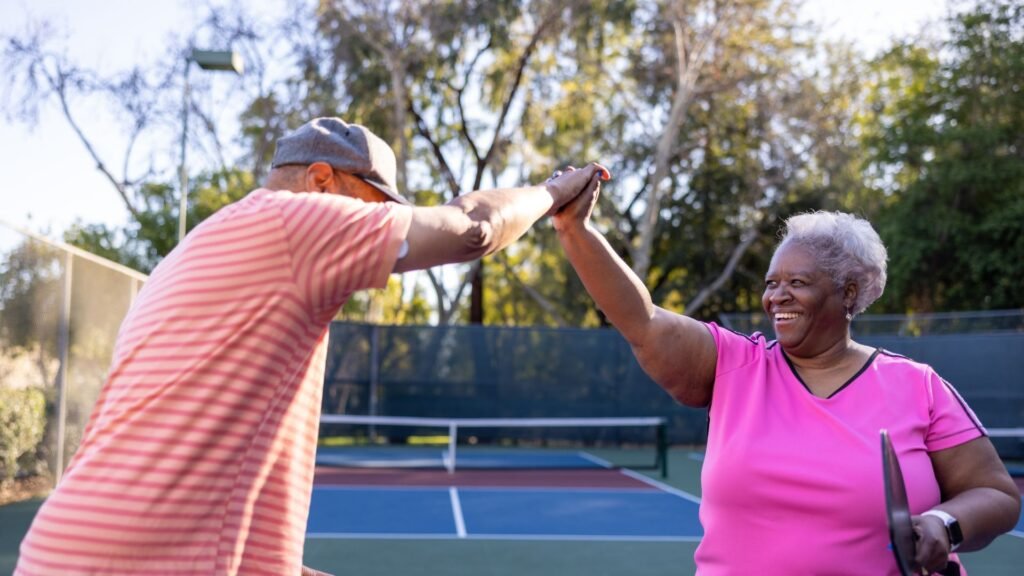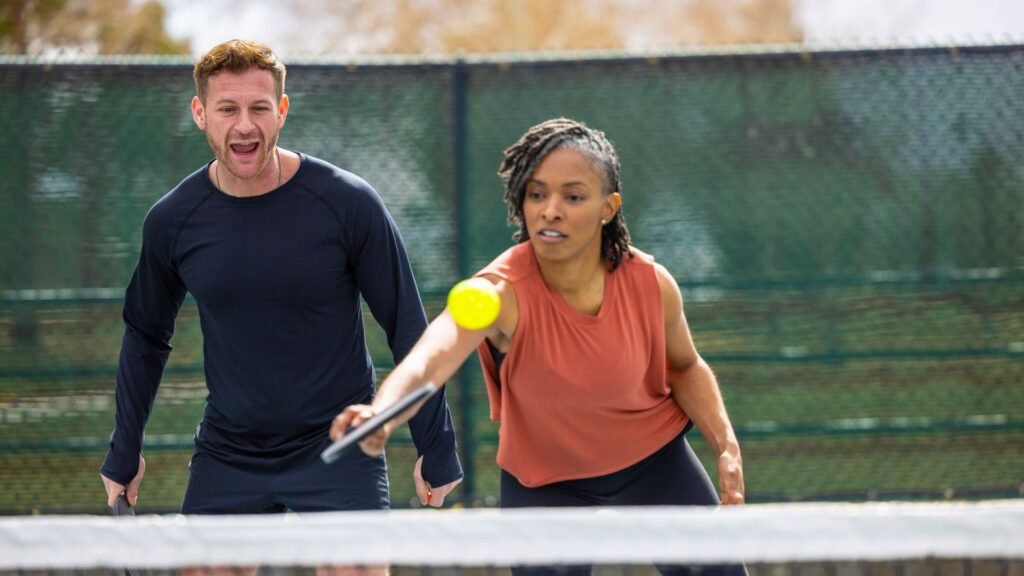Picture this: a peaceful suburban evening interrupted by the unmistakable pop-pop-pop of a pickleball game. Across the country, couples are trading slippers for sneakers, paddles in hand, and heading to the local courts. Pickleball isn’t just a hobby anymore—it’s becoming a relationship sensation. But is this trend a boon for marriages, or could it become an unexpected source of tension? Let’s explore the quirks, challenges, and laughs that pickleball can bring to relationships.
Table of Contents

Finding the Balance: Passion and Play
Pickleball brings out the best—and sometimes the beast—in couples. Sharing a love for the sport while managing those inevitable competitive vibes is no easy task.
- Set Clear Expectations: Before the first serve, have a quick chat about your goals. Are you out there for some light-hearted fun or a serious match? Clear communication can prevent playful trash talk from turning into full-on drama.
- Embrace Supportive Rivalry: Being competitive is great, but don’t forget to be each other’s biggest cheerleader. Compliment that wicked backhand and laugh off the miss-hits. Remember, it’s all about having fun while getting a little exercise.
- Know When to Take a Break: If pickleball is starting to take over your entire schedule, maybe it’s time to take a step back. Swap the court time for a movie night or dinner date every now and then—your relationship is more than just your pickleball score.
- Learn to Lose Gracefully: Let’s be real—no one likes losing, but learning to lose gracefully can go a long way in keeping the peace. Instead of dwelling on lost points, focus on what went well and share a laugh over any funny moments.
- Create Rituals Around Pickleball: Make it more than just a game. Turn pickleball nights into a tradition—pack a cooler of your favorite drinks, bring snacks, and make it a mini-date night. Creating rituals adds an extra layer of connection beyond just competition.
- Switch Up Roles: If one of you usually serves as the “coach” and the other the “learner,” try switching roles. This not only keeps things fresh but also helps build empathy as you step into each other’s shoes.

Communication: The Key to Pickleball Bliss
Playing doubles with your spouse can either sharpen your communication skills or expose your flaws. Here’s how to turn your time on the court into relationship magic:
- Listen Beyond Words: Don’t just focus on verbal communication. Pay attention to your partner’s body language. Are they silently pleading for you to cover that lob? The better you can read each other, the better you’ll play—on and off the court.
- Establish Non-Verbal Cues: Create simple hand signals, nods, or gestures to signal your next move. That way, you can keep the game flowing without having to shout over every serve.
- Celebrate Every Victory: Whether it’s an amazing cross-court shot or just surviving a long rally, celebrate the little moments. A high-five here, a fist bump there—small victories keep the fun alive.
- Work on Team Dynamics: If you’re playing doubles, treat it as an exercise in teamwork. Discuss strategies before the match and adapt them as you play. Treat your spouse as a teammate rather than an opponent, even when things get heated.
- Apologize Quickly: Mistakes are inevitable—whether it’s a missed shot or accidentally hogging the ball. A quick apology can defuse tension and keep the game enjoyable.
- Talk About the Game Afterwards: On the way home, debrief the game. What went well? What could have been better? Reflecting on your performance together can bring you closer and help you improve as a team.
Pickleball Problems: Challenges and Differences
Not every couple shares the same enthusiasm for pickleball, and that’s okay. Different skill levels or interest levels can be challenging, but they can also be opportunities for growth.
- Compromise Is Key: If one of you is all-in and the other is just tagging along, find a balance. Maybe you play a match or two, and then indulge in their favorite activity the next day. Relationships are all about give and take.
- Patience Goes a Long Way: If you’re an experienced player and your partner is still learning, keep the vibe positive. Offer gentle guidance instead of criticism. The point is to have fun—nobody wants to be coached to death.
- Make It a Social Event: Add a social element to the game. Invite friends for a doubles match or join a league together. That way, pickleball becomes part of a larger community experience, not just a two-person activity.
- Address Frustration Head-On: If either of you is feeling frustrated, talk about it. Maybe one partner feels they aren’t improving fast enough, or the other is tired of playing at a certain level. Honest conversations can prevent resentment from building.
- Mix Up the Competition: If playing against each other always leads to tension, consider teaming up instead. Facing another couple or some friends can take the pressure off your relationship and focus your competitive energy elsewhere.
- Learn Together: Take a pickleball class as a couple. Learning together can level the playing field and make the experience less intimidating for the less experienced partner.
Setting Boundaries: Pickleball vs. Personal Space
While pickleball can definitely bring couples closer, too much of a good thing can backfire. Setting boundaries around your court time can help keep it fun rather than stressful.
- Agree on Game Frequency: Discuss how often you want to play and make sure it fits into both of your schedules. One partner pushing for daily matches while the other wants some couch time can lead to friction.
- Make Room for “Me Time”: Sometimes, it’s okay if one person hits the courts alone while the other takes a break. Personal space is essential for a healthy relationship—you don’t need to do everything together.
- Leave the Competition on the Court: Win or lose, let it go after the game. Don’t let a bad match bleed into other parts of your relationship, like who’s taking out the trash or doing dishes that night. Keep competition in check.
- Avoid Over-Committing: It’s easy to get swept up in the excitement of pickleball, but over-committing to league nights or tournaments can create stress. Make sure your involvement doesn’t become overwhelming for either of you.
- Establish a “No Pickleball” Day: Sometimes, you need a break from the routine. Establishing a “no pickleball” day gives you both a chance to recharge and do something different together.
- Respect Different Needs: One partner might crave more competition while the other enjoys casual play. Respecting each other’s needs ensures that neither of you feels pressured to play in a way that isn’t enjoyable.

Q&A
Q: Can playing pickleball strengthen our marriage?
A: Definitely! It’s a wonderful way to spend quality time together, build up your teamwork, and laugh at the inevitable silly moments (like when one of you sends the ball flying over the fence). Plus, shared activities tend to deepen bonds. Couples that play together often feel more connected because they share a goal and spend quality time outside their usual routine.
Q: What if my partner and I get too competitive?
A: Channel that competitiveness into shared goals—team up against another couple or focus on beating your previous records. Just remember, you’re both on the same side at the end of the day. If the competition becomes too intense, set some ground rules to keep it light. The goal is to have fun, not to create tension.
Q: One of us is much better at pickleball. How do we manage that?
A: Be patient and encouraging. The point isn’t to dominate; it’s to enjoy the time together. If the difference in skill levels becomes frustrating, mix it up by playing with friends or attending clinics to improve together. Alternatively, consider playing mixed-level games where each of you partners with someone else to even out the competition.
Q: What are the biggest challenges of playing pickleball as a couple?
A: Balancing competitive spirits, different skill levels, and how often you want to play can all pose challenges. The key is finding balance—make sure it stays fun and doesn’t overshadow other parts of your relationship. Communication is crucial: talk about any frustrations before they fester. Keep in mind that pickleball is supposed to be an enjoyable activity, not a source of stress.
Q: How do we avoid getting burnt out on pickleball?
A: Mix it up! Don’t be afraid to take a break when needed. Plan different activities to keep things fresh—try hiking, biking, or even just having a relaxing night in. Balance is key, and avoiding burnout is all about variety.
Q: Can pickleball help couples work through relationship issues?
A: Pickleball can be a useful tool for couples to work through relationship issues. The game’s fast-paced nature and need for cooperation can encourage better communication, compromise, and problem-solving skills, aiding in the resolution of conflicts.
Q: Does playing pickleball together have any long-lasting effects on marital satisfaction?
A: Research suggests that playing pickleball together can have long-lasting positive effects on marital satisfaction. The shared experience, increased physical activity, and bonding moments on the court can all contribute to a happier and healthier relationship.
Q: Can playing pickleball together strengthen the emotional connection between partners?
A: Yes, playing pickleball together can strengthen the emotional connection between partners. Teamwork and shared experiences create opportunities for partners to support, encourage, and celebrate each other, thereby nurturing their emotional bond.
In Conclusion
Pickleball: a quirky sport that’s bringing couples closer—or testing their limits. As with any shared activity, the key is balance, a sense of humor, and open communication. When you keep the focus on fun, pickleball can be a fantastic way to connect. So, grab your paddle, hit the court, and remember—win or lose, you’re in it together. And that’s the real victory.
Whether it’s about learning to lose gracefully, cheering each other on, or simply spending more quality time together, pickleball has the potential to enrich your relationship in unexpected ways. Embrace the bumps, celebrate the wins, and laugh off the whiffs. Because at the end of the day, it’s not just about the game—it’s about the journey you’re on together, one pop at a time.
Tagged in:
communication, compromise, impact, marriages, pickleball, relationships, sports, teamwork



